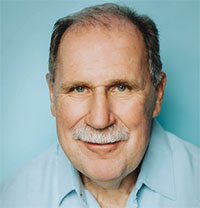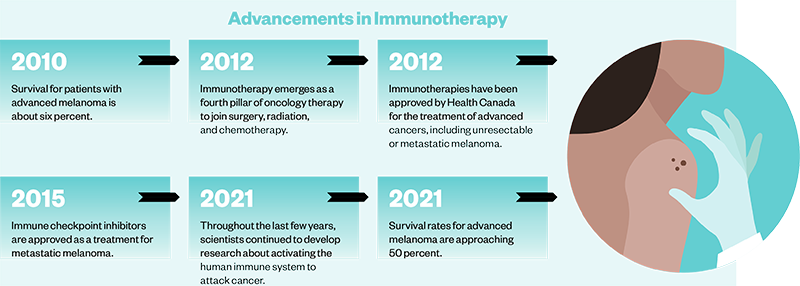
Lyall Woznesensky
Melanoma Survivor

Dr. Marcus Butler
Medical Oncology Disease Site Lead for Melanoma & Skin Oncology, Clinical Director for the Immune Monitoring Team — PMH
Treatment options for melanoma depend on its stage and location.
In August 2015, Lyall Woznesensky noticed what he thought was a blood blister on his chest. He poked it and blood came out. When it came back, his wife, Debbie, told him he better go to the doctor.
His doctor sent him for a biopsy. The result was that Woznesensky had melanoma and he would require surgery to treat it. During the surgery a few weeks later, his surgeon found that the cancer tumour in his chest went all the way to his bone and had spread to a lymph node.
“The toughest part for me was telling my wife and two kids,” says Woznesensky, who is now 68.
“Fortunately, I have the greatest, most supportive family in the world. My wife is a rock and has taken on the challenge of keeping our family positive.”
Melanoma, a type of skin cancer, starts in the melanocyte cells of the skin. A cancerous tumour is a group of cancer cells that can grow into and destroy nearby tissue. It can also spread (metastasize) to other parts of the body.
Melanoma often starts as an abnormal mole anywhere on the skin. Since most people have a few moles, which are non-cancerous, melanoma can be difficult to find. These small, round or oval spots are usually brown, tan or pink and can be raised or flat.
Treatment options for melanoma depends on its stage and location
A change in the colour, size or shape of a mole is usually the first sign of melanoma. These changes can happen in a mole that’s already on your skin or can appear as a new mole. Other possible signs of melanoma include an area of the skin that doesn’t heal, for example, a mole or sore that oozes or bleeds, or broken skin with an open wound.
Treatment for melanoma varies, depending on the stage of cancer, where it’s located, and even your personal preferences. Options can include surgery, radiation therapy, chemotherapy, targeted therapy, or immunotherapy.
“When I was a medical student and a patient had stage 4 melanoma, there was very little we could do to help them,” says Dr. Marcus Butler, Medical Oncology Disease Site Lead for Melanoma and Clinical Head of the Immune Monitoring Team at the Princess Margaret Cancer Centre in Toronto, Ontario. “About a decade ago, immunotherapies started to revolutionize treatment of late-stage cancers, including melanoma.”
Immunotherapy activates immune cells to attack the cancer
Dr. Butler explains that cancer cells exploit the body’s own systems to hide from the immune system. Immunotherapy works by activating the immune cells so they can invade tumours and attack the cancer cells. “Immunotherapy treatments lift the veil, so the immune system can see the cancer,” says Dr. Butler, adding that these therapies can improve the long-term survival of people with cancer. When facing a cancer diagnosis, he encourages patients to learn about all of the treatment options.
“There are many options for patients that weren’t available years ago,” he says. “We are now able to deliver more effective therapies to help people live fuller lives.”
After his initial diagnosis, Woznesensky had two surgeries to remove the tumour and 18 lymph nodes, followed by treatments every day for one month. Six months after his diagnosis, tumours were discovered in his liver. His cancer had spread and was now stage 4 metastatic melanoma. He started on immunotherapy, which finished in 2017. Since then, Woznesensky had been having regular checkups every three months, which was recently extended to every six months. He’s now considered to be in remission.
Grateful for the moments with family
“I’m a very fortunate person,” he says. “I know it sounds cliché, but I try to keep a positive outlook and stay as active as possible. Your mind plays tricks on you sometimes. If I’m feeling tired, I worry about whether I’m getting sick or if it’s just a regular part of being older. But I usually feel like the luckiest guy in the world.”
Woznesensky says his illness has taught him not to take anything for granted. Six years later, he’s most grateful to be able to spend time with his sons and watch them enjoying successful careers. His favourite moments happen when he gets together with his kids for birthdays, Christmas or another special day. He also loves when he and his wife, Debbie, cuddle on the couch watching sad movies. The two recently celebrated their 34th wedding anniversary.
“When I see Debbie and the kids fooling around and laughing, mostly making fun of me, it’s just the greatest feeling in the world. I am so lucky to still have the opportunity to share these experiences with my family and friends,” he says.
“I have become much more open in telling people how much I appreciate them. Most of us know how much we love our family and friends, but don’t share it. In our family, everyone says ‘I love you’ at least once a day.”
“Every day is a miracle in our lives and that’s what we are grateful for.”



